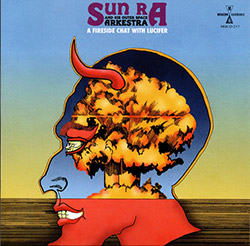
This reissue of the 1983 Saturn Research LP presents two aspects of the Sun Ra Arkestra, the first side with the 80's classics "Nuclear War" along with "Retrospect" and "Makeup"; the second side presenting the extended and more experimental "A Fireside Chat with Lucifer", a 20 minute well balanced, open framework that allows for both melodic soloing and extended free exchanges.
In Stock
Quantity in Basket: None
Log In to use our Wish List
Shipping Weight: 3.00 units
EU & UK Customers:
Discogs.com can handle your VAT payments
So please order through Discogs
Sample The Album:
Marshall Allen-alto saxophone, flute
Walter Miller-trumpet
Vincent Chancey-French horn
Hayes Burnett (and possibly John Ore)-bass
John Gilmore-tenor sax
James Jacson-bassoon, percussion
Danny Ray Thompson-baritone saxophone, flute
Samarai Celestial-drums
Tyrone Hill-trombone, vocal
Atakatune-percussion
June Tyson-vocal
Click an artist name above to see in-stock items for that artist.
UPC: 090771821720
Label: Modern Harmonic
Catalog ID: CD-MH-217
Squidco Product Code: 29819
Format: CD
Condition: New
Released: 2020
Country: USA
Packaging: Cardboard Gatefold
Recorded at Variety Studios, in New York, in September, 1982
"While the most renown track in this omniversal opus is the atomic expletive-filled repartee "Nuclear War," there is so much more to this dark mysterious journey through the mind of Sun Ra. The sprawling, suite-like 20-minute title track sustains a lyrical edge in spite of an open framework and textures, which encourage sonorities to surface and emerge from the band as if there was no human intention behind them. In opposition to "Nuclear War," Ra's organ playing here was built less on bombast and sonic terror than it is on whispers, stutters, shivers, and swells. Fireside Chat offers a wide stylistic array, as was the artist's intent, reflecting his eclectic, seemingly irreconcilable approach to compositional extremes. With Sun Ra you get everything... except predictability.
Thomas Stanley, in his ambiguously titled 2014 book, The Execution of Sun Ra, observes, "Throughout his life [Sun Ra] was consistent in his opposition to war and his art reflected this, perhaps most sharply in the space chant 'Nuclear War.' 'It's a motherfucker, don't you know,' Sun Ra and trombonist Tyrone Hill [joined by June Tyson] sing over a deceptively sparkly chromatic piano line played at a steady walking rhythm. It is worth noting that this spicy chunk of language is the only use of profanity that this author is aware of in Sonny's vast recorded song repertory." "-Modern Harmonic
Also available on vinyl LP.Artist Biographies
• Show Bio for Marshall Allen "Marshall Belford Allen (born May 25, 1924) is an American free jazz and avant-garde jazz alto saxophone player. He also performs on flute, oboe, piccolo, and EVI (an electronic valve instrument made by Steiner, Crumar company). Allen is best known for his work with eccentric keyboardist/bandleader Sun Ra, having recorded and performed mostly in this context since the late 1950s, and having led Sun Ra's Arkestra since 1993. Critic Jason Ankeny describes Marshall as "one of the most distinctive and original saxophonists of the postwar era." Marshall Allen was born in Louisville, Kentucky. During the Second World War he enlisted in the 92nd Infantry Division and was stationed in France. Allen studied alto saxophone in Paris and played in Europe with Art Simmons and James Moody. He is best known for his mastery of pyrotechnic effects on the alto - he has said that he "wanted to play on a broader sound basis rather than on chords" (1971 interview with Tam Fiofori cited in). The opportunity came through his long association with Sun Ra, with whom he performed almost exclusively from 1958 to Ra's death in 1993, although he did record outside the Arkestra, notably with Paul Bley's group in 1964 and with Olatunji's group during the mid-1960s. Critic Scott Yanow has described Allen's playing as "Johnny Hodges from another dimension". Since the departure of Sun Ra and John Gilmore, Allen has led the Arkestra, and has recorded two albums as their bandleader. In May 2004, Allen celebrated his 80th birthday on stage with the Arkestra, as part of their performance at the Ninth Vision Festival in New York City. Allen gave another performance on his birthday in 2008 at Sullivan Hall in New York City. Allen often appears in NYC-area collaborations with bassist Henry Grimes and has also participated in the "Outerzone Orchestra" together with Francisco Mora Catlett, Carl Craig and others in an appreciation of Sun Ra's music." ^ Hide Bio for Marshall Allen • Show Bio for Walter Miller "Walter Miller - Born : February 07, 1920 in Birmingham, Alabama; Died : March 28, 2004 in Cambridge, Massachusetts. American jazz trumpeter and influential anthropologist. Played with : "Sonny Blount Band", Sun Ra (1962-1966 & 1978-1982) and others." ^ Hide Bio for Walter Miller • Show Bio for Vincent Chancey "Vincent Chancey - French Horn and Composer Over the past 25 years I have built a solid reputation as an accomplished and totally dedicated french horn player, performing in a wide variety of musical contexts, and as an increasingly active composer. My first instrument as a member of the junior high school band was the cornet and later the trumpet and fluglehorn. But after hearing the french horn during rehearsals I felt a strong affinity for that instrument and was happily able to make the change. Simultaniously with my band experience in high school, I was first active in Giles Yellow Jackets and later the St. Andrews Hornets and the DesPlaines Vanguard competitive drum & bugle corps. Through high school and college, I lived a kind of musical schizophrenia, studying and playing classical music, but listening to and loving jazz. Continuing in that direction for some time, I finally decided that I needed some instruction on how to approach jazz on this instrument. Upon graduation from the Southern Illinois University School of Music, I moved to New York to seek out and study with the long-time pioneering jazz french hornist Julius Watkins. I was able to win a N.E.A. grant to begin this study program. After several years of instruction and hard practice, I first came to prominence as a regular member of the Sun Ra Arkestra from 1976 to 1978. After that I worked sporadically for Sun Ra, making a number of recordings with the ensemble, and then worked for six years with the Carla Bley Band. In 1984, I joined Lester Bowie's Brass Fantasy and have been featured on all of the group's nine recordings. For many years, I have also been part of the David Murray Big Band in which I am featured on five CD's. I have been able to employ my talent playing with Chick Corea, Cassandra Wilson, Shirley Horn, Randy Weston, The Gil Evans Orchestra and The Mingus Orchestra. In the Contemporary Classical idiom , I have worked with Guus Janssen on varied projects in The Netherlands. I have also performed with popular artists such as Ashford and Simpson, Melba Moore, Peggy Lee, Maxwell, Aretha Franklin, Freddy Jackson, The Winans, Elvis Costello, Brandy, Charlie Haden Liberation Orchestra, Dave Douglas, singer Diana Krall and many more. In 2000 I had the honor of playing a performance for Pope John Paul II's 80th birthday concert. I have recorded as a sideman with various artist on more than 150 albums, CD's and soundtracks. Eventually I came to the point that many musicians reach when they feel the need for more personal creative expression. I began writing music that could best express myself and my instrument. I felt that no one was writing for the french horn the way I knew it could be played. Several bands were put together over many years, which lead to my first CD. This recording entitled "Welcome Mr. Chancey" was released in 1993 on In + Out Records. A quartet was featured on this album using electric guitar, bass and drums. I enjoyed working with this group, but felt that I wanted to do something closer to the music that I had always listened to as a developing jazz musician, classic jazz. I started first by composing music that I thought worked with the way I liked to play my instrument. Soon after I was asked to do a CD of music commemorating my jazz horn teacher, Julius Watkins and his group, The Jazz Modes. In 1996 I recorded my second CD "Vincent Chancey and Next Mode" on DIW records. This one featured a Quintet with tenor saxophone, piano, bass, and drums. The french horn is my natural voice. Throughout my career I have been devoted to the idea of achieving wider recognition for the horn as a jazz instrument and I have constantly sought to increase the capability of the instrument and overcome the inherent problems of adapting it to the vocabulary of jazz." ^ Hide Bio for Vincent Chancey • Show Bio for John Gilmore "John Gilmore (September 28, 1931 – August 19, 1995) was an avant-garde jazz saxophonist known for his tenure with keyboardist/bandleader Sun Ra from the 1950s to the 1990s. Gilmore grew up in Chicago and played clarinet from the age of 14. He took up the tenor saxophone while serving in the United States Air Force from 1948 to 1952, then pursued a musical career, playing briefly with pianist Earl Hines before encountering Sun Ra in 1953. For the next four decades, Gilmore recorded and performed almost exclusively with Sun Ra. This was puzzling to some, who noted Gilmore's talent, and thought he could be a major star like John Coltrane or Sonny Rollins. Despite being five years older than Gilmore, Coltrane was impressed with his playing, and took informal lessons from Gilmore in the late 1950s. Coltrane's epochal, proto–free jazz "Chasin' the Trane" was inspired partly by Gilmore's sound. In 1957 he co-led with Clifford Jordan a Blue Note date that is regarded as a hard bop classic: Blowing In from Chicago. Horace Silver, Curly Russell, and Art Blakey provided the rhythm section. In the mid-1960s Gilmore toured with the Jazz Messengers and he participated in recording sessions with Paul Bley, Andrew Hill (Andrew! and Compulsion), Pete La Roca (Turkish Women at the Bath), McCoy Tyner (Today and Tomorrow) and a handful of others. In 1970 he co-led a recording with Jamaican trumpeter Dizzy Reece. His main focus throughout, however, remained with the Sun Ra Arkestra. Gilmore's devotion to Sun Ra was due, in part, to the latter's use of harmony, which Gilmore considered both unique and a logical extension of bebop. Gilmore had stated that Sun Ra was "more stretched out than Monk" and that "I'm not gonna run across anybody who's moving as fast as Sun Ra ... So I just stay where I am." Gilmore occasionally doubled on drums and also played bass clarinet until Sun Ra hired Robert Cummings as a specialist on the latter instrument in the mid-1950s. However, tenor sax was his main instrument and Gilmore himself made a huge contribution to Sun Ra's recordings and was the Arkestra's leading sideman, being given solos on almost every track on which he appeared. In the Rough Guide to Jazz, Brian Priestley says: Many fans of jazz saxophone consider him to be among the greatest ever, his fame shrouded in the relative anonymity of being a member of Sun Ra's Arkestra. His "straight ahead post-bop" talents are exemplified in his solo on the Arkestra's rendition of "Blue Lou," as seen on Mystery, Mr. Ra. After Sun Ra's 1993 death, Gilmore led Ra's Arkestra for a few years before his own death from emphysema. Marshall Allen then took over the Arkestra leadership." ^ Hide Bio for John Gilmore • Show Bio for Danny Ray Thompson Danny Ray Thompson is a bassoon player, saxophonist and long-time member of the Sun Ra Arkestra, spanning a period from the mid-'60s to the late '80s. He has been in the groups Black Heat, The Heliosonic Tone-tette, and The Sun Ra Arkestra. ^ Hide Bio for Danny Ray Thompson • Show Bio for Tyrone Hill "Trombonist Tyrone Hill remains best remembered for a three-decade stint as a member of cosmic jazz pioneer Sun Ra's Arkestra. Born in north Philadelphia in 1949, Hill first played the trombone in his middle school band. A neighbor of fledgling jazz greats including John Coltrane, Odean Pope, and Middie Middleton, he also harmonized in a local doo wop group. After four years studying trombone at the Combs School of Music, Hill tenured with the Uptown Theatre Orchestra, supporting headliners ranging from Smokey Robinson & the Miracles to James Brown. In 1969, he auditioned for Sun Ra but played only a handful of dates with the Arkestra before joining Philly soul hitmaker Billy Paul in 1971. Hill spent eight years touring and recording as Paul's musical director before returning to Philadelphia to rejoin the Arkestra on a permanent basis. In the years to follow, he played on more than three dozen Sun Ra LPs, and continued with the group following its founder's 1993 final departure from the terrestrial plane. In 1997 Hill recorded his first solo date, Out of the Box, for the Creative Improvised Music Projects label; a sequel, Soul-Etude, followed two years later. Hill left the planet on March 11, 2007, at the age of 58."-Jason Ankeny, All Music ^ Hide Bio for Tyrone Hill • Show Bio for Atakatune "Atakatune, aka Stanley Leon Morgan, Born in Philadelphia, PA in 1953, My father spent his childhood sharing time between Camden New Jersey and Philadelphia's Germantown neighborhood. It was in Germantown where he began a relationship at age 19 that would change his life forever. He first began to play the conga drums for Sun Ra's Arkestra in 1972 and would soon come to be referred to as "the premier Conga player and percussionist" under the direction of the Great Cosmic Philosopher Sun Ra." ^ Hide Bio for Atakatune • Show Bio for June Tyson "June Tyson (born February 5, 1936, Albemarle, North Carolina - d. November 24, 1992, Philadelphia, Pennsylvania) was a singer and dancer who achieved prominence performing with keyboardist and bandleader Sun Ra. When she joined Sun Ra's Arkestra around 1968, she became the first female member of his band. (Sun Ra had previously recorded with a few female vocalists, but they were not members of his band.) She became a close and trusted friend of Ra, and helped him with costume design. Tyson continued to perform and record with Ra up to her death. Tyson was diagnosed with cancer and grew increasingly ill. When she was unable to sing because of her illness, she played the violin." ^ Hide Bio for June Tyson
11/20/2024
Have a better biography or biography source? Please Contact Us so that we can update this biography.
11/20/2024
Have a better biography or biography source? Please Contact Us so that we can update this biography.
11/20/2024
Have a better biography or biography source? Please Contact Us so that we can update this biography.
Gilmore is known for two rather different styles of tenor playing. On performances of a straight ahead post-bop character (which include many of those with Sun Ra), he runs the changes with a fluency and tone halfway between Johnny Griffin and Wardell Gray, and with a rhythmic and motivic approach which he claims influenced Coltrane. On more abstract material, he is capable of long passages based exclusively on high-register squeals. Especially when heard live, Gilmore was one of the few musicians who carried sufficient conviction to encompass both approaches.
11/20/2024
Have a better biography or biography source? Please Contact Us so that we can update this biography.
Have a better biography or biography source? Please Contact Us so that we can update this biography.
11/20/2024
Have a better biography or biography source? Please Contact Us so that we can update this biography.
11/20/2024
Have a better biography or biography source? Please Contact Us so that we can update this biography.
11/20/2024
Have a better biography or biography source? Please Contact Us so that we can update this biography.
Track Listing:
1. Nuclear War 7:44
2. Retrospect 5:41
3. Makeup 4:56
4. A Fireside Chat with Lucifer 20:53
Improvised Music
Jazz
Sun Ra
Large Ensembles
Song Based Music
Jazz Reissues
Search for other titles on the label:
Modern Harmonic.


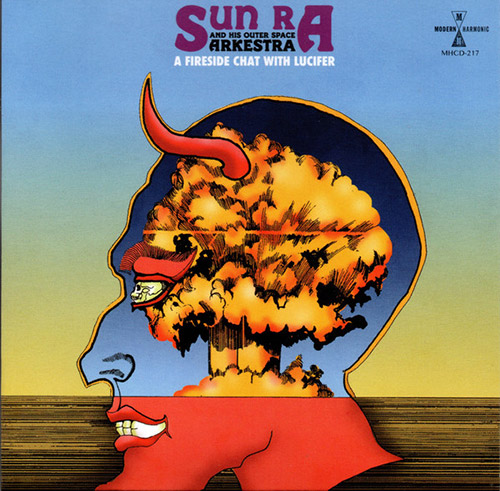
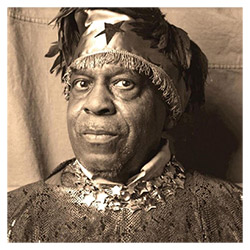
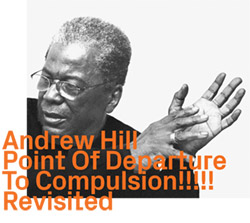
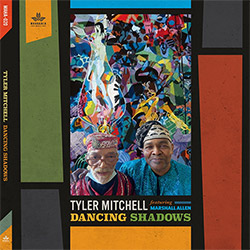

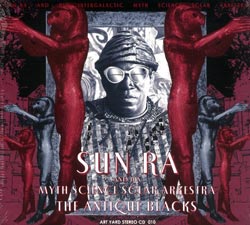
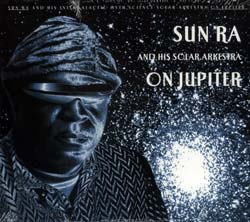
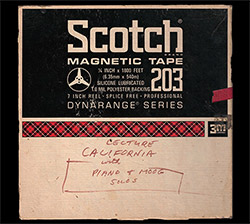

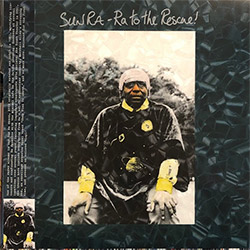


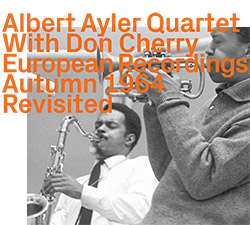
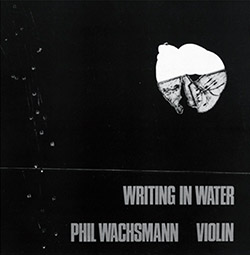
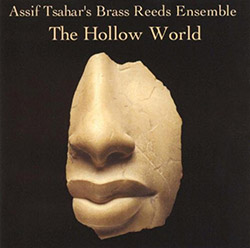
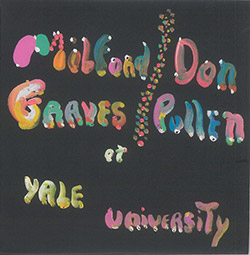
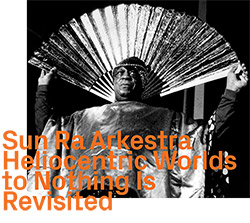
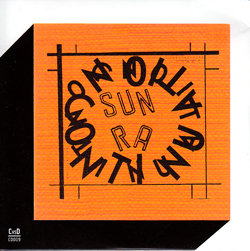

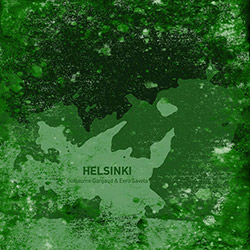








![Guy, Barry / Ken Vandermark: Occasional Poems [2 CDs]](https://www.teuthida.com/productImages/misc4/34849.jpg)
![Novoa / Carter / Mela Trio: Vol.1 [VINYL]](https://www.teuthida.com/productImages/misc4/35236.jpg)


![Elephant9 : Mythical River [VINYL]](https://www.teuthida.com/productImages/misc4/34624.jpg)
![Evans, Peter (Evans / Eldh / Black): Extra [VINYL]](https://www.teuthida.com/productImages/misc4/35279.jpg)

![McPhee, Joe: Straight Up, Without Wings [BOOK]](https://www.teuthida.com/productImages/misc4/35454.jpg)
![Jeck, Philip: rpm [2 CDs]](https://www.teuthida.com/productImages/misc4/35455.jpg)













![Barker / Parker / Irabagon: Bakunawa [VINYL]](https://www.teuthida.com/productImages/misc4/35533.jpg)
![Blaser, Samuel / Marc Ducret / Peter Bruun: Dark Was The Night, Cold Was The Ground [VINYL 10-inch]](https://www.teuthida.com/productImages/misc4/35492.jpg)








![Warren, Kenny (Warren / Hoffman / Ellman): Sweet World [VINYL]](https://www.teuthida.com/productImages/misc4/35451.jpg)




![Blake, Ran / Dave Knife Fabris: Live Amsterdam 2006, First Visit [CD + POSTCARDS]](https://www.teuthida.com/productImages/misc4/35275.jpg)













![DNS: Taking Big Bites Of The Khandas Three Cafes Deep [2 CDs]](https://www.teuthida.com/productImages/misc4/35334.jpg)




![Cleaver, Gerald: The Process [VINYL]](https://www.teuthida.com/productImages/misc4/34966.jpg)




![Alva Noto: HYbr:ID II [VINYL 2 LPs]](https://www.teuthida.com/productImages/misc4/35201.jpg)

![Baron, Derek / Luke Martin: Distinct and Concealed [CASSETTE + DOWNLOAD]](https://www.teuthida.com/productImages/misc4/35079.jpg)

![Lyle, Erica Dawn : Colonial Motels [CASSETTE + DOWNLOAD]](https://www.teuthida.com/productImages/misc4/35080.jpg)









![Sanna, Claudio: Compositori Sardi Contemporanei II [2 CDs]](https://www.teuthida.com/productImages/misc4/35317.jpg)







![Zurria, Manuel: Fame di Vento [3 CDs]](https://www.teuthida.com/productImages/misc4/35167.jpg)

![Granberg, Magnus / Nattens Inbrott / Skogen: Holde Traume, Kehret Wieder! [2 CDs]](https://www.teuthida.com/productImages/misc4/35038.jpg)
![Frey, Jurg: Outermost Melodie [2 CDs]](https://www.teuthida.com/productImages/misc4/35039.jpg)

![Pavone, Jessica: Reverse Bloom [VINYL]](https://www.teuthida.com/productImages/misc4/34895.jpg)




![Modney (Modney / Wooley / Gentile / Roberts / Pluta / Symthe / ...): Ascending Primes [2 CDs]](https://www.teuthida.com/productImages/misc4/34852.jpg)









![Elephant9 with Terje Rypdal: Catching Fire [VINYL 2 LPs]](https://www.teuthida.com/productImages/misc4/35355.jpg)
![Deerlady (Obomsawin, Mali / Magdalena Abrego): Greatest Hits [VINYL]](https://www.teuthida.com/productImages/misc4/34876.jpg)




![Haino, Keiji: Black Blues [2 CDs]](https://www.teuthida.com/productImages/misc4/35109.jpg)



![Surplus 1980: Illusion of Consistency [CD]](https://www.teuthida.com/productImages/misc4/35069.jpg)
![Staiano, Moe: Away Towards the Light [VINYL + DOWNLOAD]](https://www.teuthida.com/productImages/misc4/35037.jpg)



![Caveira (Gomes / Sousa / Abras / Ferrandini): Ficar Vivo [VINYL]](https://www.teuthida.com/productImages/misc4/34643.jpg)
![Gregg, J. J. / David Van Auken: Lunar Prairie [CD w/ DOWNLOAD]](https://www.teuthida.com/productImages/misc4/34611.jpg)

![Coultrain: Mundus [VINYL]](https://www.teuthida.com/productImages/misc4/32439.jpg)
![Mattin: Songbook #6 [VINYL]](https://www.teuthida.com/productImages/misc4/27317.jpg)
![Punkappella: Wake Up [7-inch VINYL]](https://www.teuthida.com/productImages/misc4/17519.jpg)
![Residents, The: WARNING: UNiNC.: Live And Experimental Recordings 1971-1972 [VINYL 2 LPs]](https://www.teuthida.com/productImages/misc4/31521.jpg)
![Coultrain: Phantasmagoria [VINYL]](https://www.teuthida.com/productImages/misc4/30142.jpg)
![Lennon, Sean Ono: Asterisms [VINYL]](https://www.teuthida.com/productImages/misc4/34517.jpg)

![Coley, Byron: Dating Tips for Touring Bands [VINYL]](https://www.teuthida.com/productImages/misc4/17906.jpg)

![Lost Kisses: My Life is Sad & Funny [DVD]](https://www.teuthida.com/productImages/misc4/lostKissesDVD.jpg)